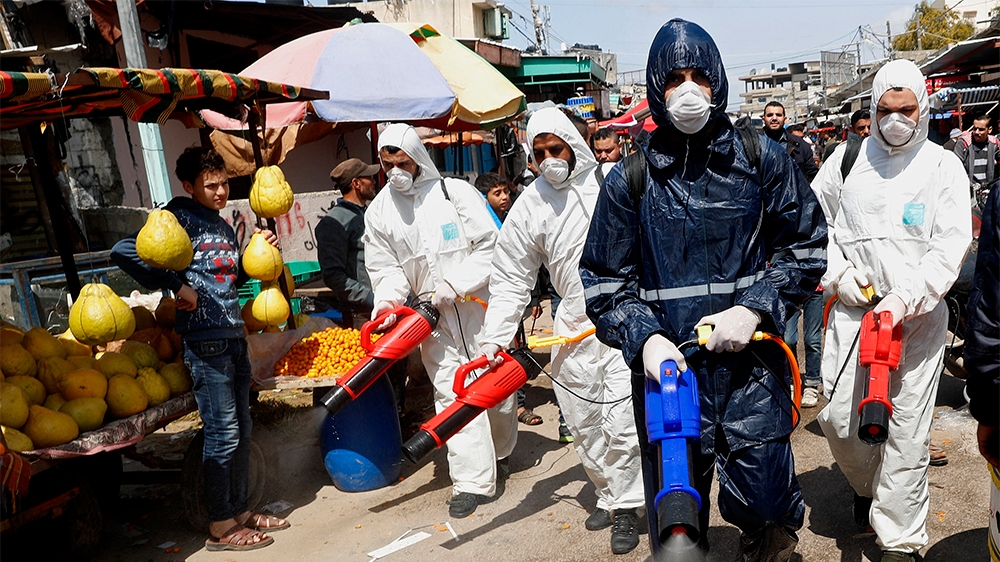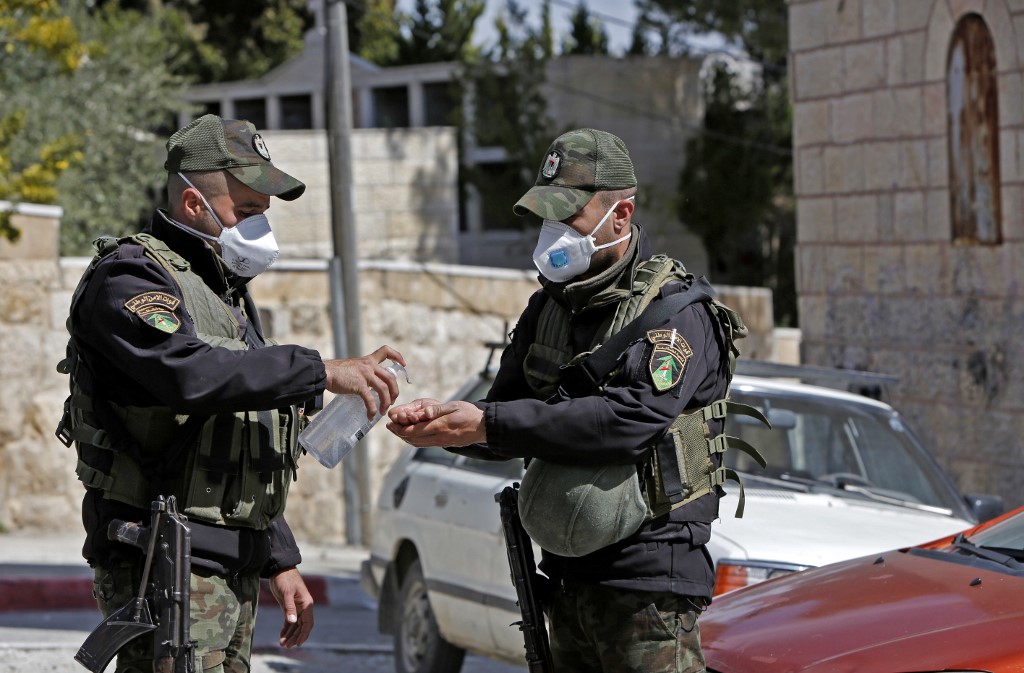Australia/Israel Review
A coronavirus ceasefire?
Apr 1, 2020 | Anna Ahronheim

Israel and the Gaza Strip are once again at war. But this time the enemy isn’t in the form of rockets or airstrikes but rather an invisible enemy. One that has crept into every country across the world, blind to religion and nationality, killing thousands.
Israel’s war against the novel coronavirus – which has claimed the life of one man and has been diagnosed in 1,238 others as of March 23 – began over a month ago. Borders were quickly closed to travellers, and citizens who flew into the country were ordered to self-quarantine for two weeks to prevent the spread of the deadly disease.

Palestinian security forces wearing masks disinfect their hands next to a hotel that has been sealed off in the town of Beit Jala following suspected cases of coronavirus COVID-19, on March 5, 2020 (Photo: Musa Al SHAER / AFP)
But the numbers kept rising in Israel and in early March the first positive diagnosis was announced in the West Bank city of Bethlehem and the virus quickly spread across the Palestinian territories.
Israel, in coordination with Palestinian Authority forces, imposed a closure on Bethlehem and, more recently, closed all crossings to and from the West Bank save for humanitarian cases.
Yet, there was a sliver of hope with the Hamas-run Gaza Strip where there had been no cases… until March 22, when two men who had just returned from Pakistan via Egypt tested positive.
There were jokes going around in Gaza prior to the first cases that the virus was too afraid to enter the Strip and that the blockaded enclave may be the “safest place in the world.”
Nadia Abushaban, a 25-year-old activist from Gaza City, wrote in early March that “we haven’t died from four wars, chemicals, toxic gases that half of our youth inhaled near the border fence [with Israel], light bombs, or phosphorus. You think we would die of corona with cream? Relax people,” she joked, referring to a chocolate-covered wafer biscuit with a cream filling called Korona that is popular in Gaza.
But weeks later, the jokes have turned to real fear.
The streets of Gaza, one of the most densely populated areas in the world, are eerily quiet. Save for trying to buy food, whole families are staying home.
The World Health Organisation (WHO) has warned that Gaza’s healthcare system would not be able to deal with an outbreak of the deadly disease in the coastal enclave home to nearly 2 million people.
Hamas violently took power in the 40-kilometre Gaza Strip in 2007 and a blockade imposed by Israel has reduced the supplies of fuel, electricity and medical supplies, making it doubtful that the medical infrastructure would be able to contend with such a crisis.
The Strip’s weak healthcare infrastructure, with fewer than 3,000 beds in total, is unable to cope with the responsibility for caring for the sick.
WHO has stated that the organisation supports the establishment of a field hospital at the Rafah crossing with 38 beds, including 6 intensive care unit beds.
Another 50 rooms will be established as a quarantine area for travellers. The Gaza European Hospital will also be designated to absorb and treat additional cases should the field hospital reach full capacity.
But that’s likely not even close to enough should Gaza experience a full-blown outbreak of coronavirus.
And Israel will not be able to avoid assuming responsibility for it.
Eitan Dangot, the former commander of Israel’s Coordination of Government Activities in the Territories (COGAT), said Hamas must put its terrorism aside and focus on protecting and caring for the population.
“Israel cannot be blamed, Israel is suffering already from this virus,” he said.
“It’s time that Hamas takes a look inwards and supports their own population” he said, adding that if “Hamas takes a few steps towards Israel, such as returning the bodies, such steps can reduce the tensions and can build trust” between the two foes.
Once that step is taken by Hamas, another crossing could be opened with the Gaza Strip to allow for more humanitarian goods into the beleaguered coastal enclave.
According to Dangot, while there is an exchange of information and professional collaboration between Israeli and Palestinian health care workers from the West Bank, “we aren’t doing that in Gaza.”
And while only two people there have so far been confirmed to have the virus, the speed with which the virus spreads “would be a significant problem in Gaza,” Dangot said, warning that an outbreak of the virus “can also cause an internal explosion which can affect the security situation with Israel.”
A senior official in the Palestinian Ministry of Health told Israel Hayom on Sunday that there is major concern that if the virus spreads in Gaza and the already fragile healthcare system collapses, “thousands of Palestinians will try to reach the Israeli border.”
That scenario would be a nightmare for Israeli security forces who are ordered to prevent any Palestinian from infiltrating into Israeli territory. There is no way to spin footage of IDF troops firing towards Palestinians seeking medical care to help them in the worldwide fight against the novel coronavirus.
And if they get in, will they transmit the virus to troops who would be unable to screen every person for the virus? What then? Place all those troops in quarantine? How will the military continue to protect Israel’s borders if hundreds of troops are in self-isolation or sick with the virus?
Israel and Hamas have been working towards a long-term ceasefire arrangement in recent months and since the outbreak of the virus there has been a significant drop in attacks from the Strip, be it incendiary balloons or armed infiltration attempts.
If there is any positive to be found in this worldwide pandemic, it is that two warring parties are both facing the same deadly invisible enemy. The fight against the coronavirus has strengthened the coordination between Israel and the PA in the West Bank and can be a reason to work towards a ceasefire arrangement with Hamas in the Gaza Strip.
Anna Ahronheim is the military affairs reporter for the Jerusalem Post. © Jerusalem Post (www.jpost.com), reprinted by permission, all rights reserved.
Tags: coronavirus, Israel, Palestinians






